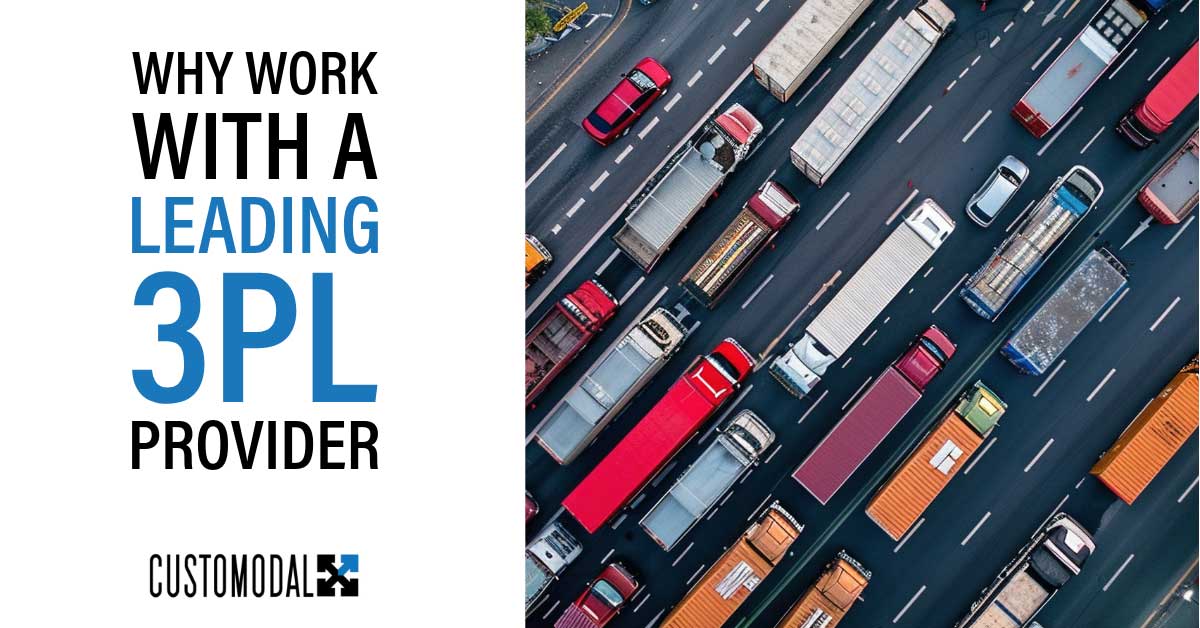
If you are feeling the pressure to modernize your logistics operations with cutting-edge technology, you’re not alone. The promise of digital transformation – increased efficiency, greater visibility, and significant cost savings – is undeniably appealing. From real-time tracking systems to sophisticated analytics platforms, the logistics industry is rapidly embracing a digital future. However, for many businesses, the thought of substantial IT investment, complex integrations, and ongoing management often gives pause. The vision of a streamlined, technologically advanced supply chain can quickly be overshadowed by the looming specter of IT headaches.
So, how can businesses unlock the profound benefits of digital logistics without taking on the immense internal IT burden? Is there a way to access powerful digital tools and transform your freight operations without the drain on your internal resources or the need to become an IT expert? The answer lies in a strategic partnership: a tech-enabled Third-Party Logistics (3PL) provider. This approach allows you to harness the power of a comprehensive digital freight solution, effectively outsourcing the technological complexities and focusing on what you do best.
The Allure of Digital Transformation in Logistics
The imperative for digital adoption in logistics is no longer a matter of competitive advantage; it's a fundamental necessity. In today's fast-paced global economy, businesses that lag in digital transformation risk being outmaneuvered by more agile, tech-savvy competitors. Digital solutions are reshaping every facet of supply chain management, offering capabilities that were once unimaginable.
Consider the tangible benefits of embracing tech-enabled logistics:
-
Improved Visibility: Perhaps the most frequently cited benefit, end-to-end supply chain visibility is critical. Imagine knowing the exact location and status of every shipment at any given moment. This real-time tracking capability dramatically reduces uncertainty, improves customer communication, and allows for proactive problem-solving.
-
Enhanced Efficiency: Digital tools streamline operations, automate repetitive tasks, and drastically reduce manual errors. From automated dispatching to digital documentation, efficiency gains are substantial. According to a study by MarketsandMarkets, the global logistics automation market is projected to grow from USD 46.5 billion in 2023 to USD 76.5 billion by 2028, at a CAGR of 10.5%, primarily driven by the undeniable need for increased operational efficiency.
-
Cost Reduction: Digital freight solutions directly reduce costs by optimizing routes, consolidating shipments, and minimizing delays. Automated freight auditing, for instance, can quickly identify billing errors that might otherwise go unnoticed, saving your business money.
-
Better Decision-Making: Advanced analytics platforms transform raw data into actionable insights. This empowers businesses to make more informed decisions, from strategic network optimization to daily carrier selection. A survey by Supply Chain Dive found that 70% of supply chain professionals believe data analytics is "critical" or "very important" to their operations, underscoring its importance in modern logistics.
These benefits are compelling, but they often come with a hidden cost: the considerable internal IT burden.
The Internal IT Burden: Why Businesses Hesitate
While the advantages of digital logistics are clear, the path to achieving them can seem daunting. For many companies, building and managing an in-house logistics IT infrastructure presents a series of significant hurdles:
-
Significant Upfront Investment: Implementing advanced logistics technology requires substantial capital. This isn't just about software licenses; it includes hardware upgrades, server infrastructure, network enhancements, and the potentially costly initial setup and configuration process. Are you prepared for the substantial capital outlay to build and maintain a robust in-house logistics IT system? For many businesses, diverting such large sums from core operations is simply not feasible.
-
Ongoing Maintenance and Management: The initial investment is just the beginning. Once deployed, these systems demand continuous maintenance, regular updates, and prompt troubleshooting. This necessitates dedicated IT staff, which incurs ongoing salary costs and benefits. Furthermore, the ever-present threat of cyberattacks means constant vigilance and investment in robust cybersecurity measures to protect sensitive data. The cumulative operational costs can quickly add up, often exceeding initial projections.
-
Complexity of Integration: Modern supply chains are rarely isolated. New logistics systems must integrate seamlessly with existing enterprise resource planning (ERP) systems, warehouse management systems (WMS), customer relationship management (CRM) software, and other business platforms. This is rarely a plug-and-play scenario. The challenge of ensuring seamless data flow, avoiding information silos, and resolving technical conflicts can be immense.
For example, connecting a new Transportation Management System (TMS) with your existing accounting software, customer portals, or even your internal inventory management system can be a significant technical undertaking, often requiring custom development and extensive testing.
-
The Need for Specialized Expertise: Logistics technology is a specialized field. It requires personnel not only with IT proficiency but also with a deep understanding of supply chain processes. Hiring or training internal teams with this specific blend of knowledge can be incredibly challenging and expensive. Moreover, the pace of technological advancement means constantly learning and adapting. Do you have the in-house expertise to navigate the complex world of logistics IT, or would acquiring it divert critical resources and focus from your core business objectives?
These challenges often lead businesses to delay or abandon their digital transformation efforts, inadvertently sacrificing these technologies' competitive edge. This is where a strategic alternative offers a clear path forward.
The Strategic Advantage: A Tech-Enabled 3PL as Your Digital Freight Solution
What if you could access all the benefits of cutting-edge logistics technology without the associated IT burden? This is precisely what a tech-enabled 3PL offers. A tech-enabled 3PL isn't just a service provider; it's a strategic partner integrating advanced technology directly into its core service offering. The technology isn't an add-on; it's an inherent part of their comprehensive solution.
Here's how partnering with a tech-enabled 3PL provides a strategic advantage and serves as your ideal digital freight solution:
-
Access to Cutting-Edge Technology Without Ownership is perhaps the most compelling benefit. When you partner with a 3PL, you gain immediate access to state-of-the-art platforms, including Transportation Management Systems (TMS), Warehouse Management Systems (WMS), advanced visibility tools, and sophisticated analytics dashboards without significant capital expenditure. For instance, you can leverage their sophisticated optimization algorithms for route planning or freight consolidation, which would be prohibitively expensive to develop and maintain in-house.
This effectively becomes outsourced logistics technology, allowing you to reap the rewards of innovation without the upfront investment or ongoing headaches. For a deeper dive into the importance of systems like a TMS, you might find this article insightful: TMS 101: Every Shipper Needs a Transportation Management System.
-
Shifting the IT Burden: This is where the true relief comes for businesses. A reputable 3PL handles all the IT investment, infrastructure, software licenses, maintenance, upgrades, and critical cybersecurity measures. All those common logistics IT headaches – system crashes, software updates, data breaches – become the 3PL's responsibility. Imagine having access to enterprise-grade logistics software and robust IT infrastructure without the burden of managing servers, software licenses, or system updates. This allows your internal IT team to focus on your core business systems and innovation.
-
Built-in Expertise and Support: Tech-enabled 3PLs employ dedicated teams of logistics IT professionals, data analysts, and supply chain specialists. They possess the specific knowledge and experience required to implement, manage, and optimize complex logistics technologies. This means you benefit from their collective expertise and continuous support. They can also provide training for your team on their platforms, ensuring smooth adoption and utilization. It's worth noting that a significant percentage of leading companies leverage 3PL services for their specialized knowledge.
For example, a study by Armstrong & Associates found that 86% of Fortune 500 companies use 3PL services, largely due to their specialized expertise and ability to handle complex logistics challenges. This highlights the trust placed in 3PLs for their deep industry and technological understanding. For more on the benefits of partnering with a leading 3PL, consider reading Benefits of Working with a Leading 3PL Provider.
-
Scalability and Flexibility: As your business grows, shrinks, or experiences seasonal fluctuations, a 3PL's technology scales with you. You don't need to invest in more hardware or software licenses during peak seasons, nor do you carry idle IT assets during slower periods. This inherent flexibility allows you to adapt quickly to market changes and evolving business needs without additional IT infrastructure investment. Do you need a 3PL digital solution that can grow with your business, without requiring constant reinvestment in IT? A tech-enabled 3PL offers precisely that adaptability.
How a 3PL Simplifies Logistics Operations
Beyond merely offloading IT, a tech-enabled 3PL profoundly simplifies logistics operations by integrating technology into every step of the supply chain journey:
-
Streamlined Processes: By leveraging integrated platforms, 3PLs consolidate tasks such as quoting, booking, real-time tracking, and invoicing into a single, cohesive system. This drastically reduces manual intervention and automates routine tasks, helping to simplify logistics across your entire operation.
-
Enhanced Data and Analytics: With a 3PL, you can access comprehensive reports and intuitive dashboards, providing deep insights into your logistics performance. This data allows for proactive identification of bottlenecks, cost drivers, and areas for improvement. For example, a 3PL's analytics platform can pinpoint underperforming carriers, identify inefficiencies in your shipping lanes, or uncover hidden costs that were previously obscured.
-
Improved Collaboration and Communication: A centralized digital platform fosters seamless communication among all stakeholders – shippers, carriers, and your customers. This reduces miscommunication, eliminates unnecessary phone calls and emails, and ensures everyone works with the most current information, leading to fewer errors and faster resolutions.
-
Focus on Core Competencies: Perhaps one of the most invaluable benefits is the ability to refocus your internal resources. By offloading the complexities of logistics, IT management, and day-to-day operations to an expert 3PL, your team can dedicate their time, energy, and capital to your primary business functions, driving innovation and growth in your core market.
Your Path to Digital Freight Management
The journey to efficient, visible, and cost-effective digital freight management doesn't have to be fraught with IT headaches. Businesses no longer need to choose between embracing digital transformation and avoiding the overwhelming complexities of building and maintaining an in-house logistics IT infrastructure. Strategic partnerships with a tech-enabled 3PL offer a powerful alternative.
By leveraging a 3PL digital solution, you can access cutting-edge logistics technology, simplify your operations, gain unparalleled visibility, and reduce costs, all while sidestepping the significant IT investments and management burdens. This collaborative, tech-driven approach is the future of logistics.
If you're ready to unlock these benefits and transform your supply chain, consider exploring a partnership with a leading 3PL. Companies like Customodal offer advanced digital solutions to streamline your freight management without placing the internal IT burden on your shoulders. Learn more about how a comprehensive 3PL digital solution can empower your business and propel your supply chain into the future.





